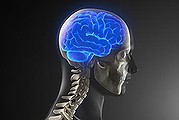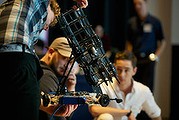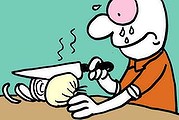
Flat emissions result masks impact of carbon tax
PETER HANNAM The carbon tax is succeeding in cutting greenhouse gas emissions in the parts of the economy where it applies, Labor and the Greens say.
Latest science news
CSIRO 'apologises' for lack of research on dragons

BEN WESTCOTT 12:26pm The CSIRO has promised to step up its dragon research program, after a seven-year old girl wrote asking them to make her a dragon.
Cancer breakthrough: researchers discover key protein

BRIDIE SMITH Researchers have discovered that by disabling a protein found in lymphoma cells they can limit the cancer's growth and ultimately make it disappear.
Terminators or protectors? Rise of the robot soldiers may be closer than you think

Tom Chivers President Obama's use of drones to kill is turning science fiction into fact.
Asian powers open new chapter in space race

CHRIS ZAPPONE New powers are giving the US - and each other - competition that's out of this world.
Meet Abigaille, the wall-walking space gecko

A wall-crawling robot inspired by the gecko has taken a small but important step towards a future in space, scientists say.
Foodini 3D prints your dinner

Colin Daileda A new 3D printer for the kitchen aims to take the pain out of cooking at home.
Scientists create glow-in-the-dark pigs with jellyfish DNA

Chinese scientists have unveiled a litter of glow-in-the-dark piglets.
Brain-like computers are learning from experience

John Markoff Computers have entered the age when they are able to learn from their own mistakes, a development that is about to turn the digital world on its head.
Fossilised seal bone discovered off Beaumaris beach is about six million years old

BRIDIE SMITH It was its odd shape that made the fossilised piece of bone stand out on the sea floor. Seasoned amateur diver Ross Wilkie hadn't seen anything like it before. So he did what any collector would do. He plucked it from its watery world and took it home.
Beaumaris fossil sheds light on ancient seals

Bridie Smith It was its odd shape that made the fossilised piece of bone stand out on the sea floor. Seasoned amateur diver Ross Wilkie hadn't seen anything like it before. So he did what any collector would do. He plucked it from its watery world and took it home.
Dog-to-human translator headset gets funding

Chris Taylor A translation prototype for dogs called No More Woof has earned almost $US15,000 in funding on Indiegogo.
Antarctic tourist ship trapped by sea ice

Nicky Phillips, Colin Cosier Tourists on an Antarctic-bound cruise liner will spend Christmas awaiting rescue after the ship became wedged in thick sheets of sea ice.
NASA completes Christmas Eve spacewalk

Marcia Dunn Cape Canaveral, Florida: Space station astronauts repaired a crippled cooling system during a rare Christmas Eve spacewalk on Tuesday, braving a "mini-blizzard" of noxious ammonia as they popped in a new pump.
Man flu: it affects manly men, research suggests

Lydia Hales "Manlier" men are less resistant to the effects of one strain of the flu, new research suggests.
NASA video recreation captures making of Earth's most iconic photographs

Adario Strange The making of the iconic space photographs that put Earth in its proper celestial context 45 years ago has been recreated by a new NASA visualisation.
Robots to the rescue at DARPA trials in Florida

Zachary Fagenson Successes were as common as failures at a US military robotics challenge this weekend.
Deltaprintr: uni student couldn't afford a 3D printer, so he built one

Samantha Murphy Kelly When university student Shai Schechter didn't have access to an affordable 3D printer, he set out to build his own model - one that would still crank out 3D-printed objects, but at a much lower cost.
Compounds in scorpion venom could be used in painkillers

BRIDIE SMITH Scientists have found unique compounds in the venom of Australian scorpions that have potential uses in pain management drugs.
Australian scorpion venom could be the next painkiller

BRIDIE SMITH Scientists have found the venom of Australian scorpions could help alleviate pain.
Bringing dinosaurs back to life? It's for the birds, says biochemist

They last roamed the Earth about 65 million years ago, but dinosaurs really could be brought back to life, a biochemist at Oxford University believes.
Space station emergency repairs successful

The first in a series of emergency spacewalks to fix a cooling system failure on the International Space Station went off without a hitch Saturday morning.
Resupply ship puts Casey Antarctic station's Christmas on ice

NICKY PHILLIPS Anthony Hull, the leader of the Casey Antarctic station, affectionately calls himself ''the Grinch''.
Scientists find way to make ageing clock stop ticking

BRIDIE SMITH Scientists in Australia and the US believe they have found a way to rewind the ageing process after turning the muscles of a mouse equivalent to a 60-year-old person into those of a 20-year-old.
Dickson College's young drone developers keep 'em flying

FLETA PAGE For Dickson College, a sponsorship from a supplier of drones to the US Defence Department raised some questions.
Europe launches billion-dollar Milky Way telescope

Richard Ingham The European Space Agency has launched an advanced telescope designed to detect a billion stars and provide the most detailed map yet of the Milky Way.
Eye cells 3D-printed for first time

Scientists have used an inkjet printer to print cells from the eye, making a practical step in the quest to grow replenishment tissue for damaged or diseased organs.
Neanderthal toe points to history of incest

BRIDIE SMITH The fossilised toe of a 50,000 year-old Neanderthal woman shows inbreeding was not uncommon in our nearest extinct relatives.
A treacherous ice walk on a penguin safari

NICKY PHILLIPS Science Editor Nicky Phillips and video journalist Colin Cosier are on a four-week expedition to Antarctica, based in Casey station.
Survival training: bunking down for a night on the ice

COLIN COSIER Almost every Antarctic expeditioner sleeps on the ice at some point.
Features
Polar expedition
Fairfax Media heads to Antarctica to examine the effects of climate change.
The secret to running repairs
Scientists think the Mexican walking fish may hold the key to regeneration in humans.
Alive as a dodo
Bringing animals back from extinction is no longer science fiction. But the question is, should we do it?
Don't forget Alzheimer's
Society can't afford to ignore dementia.
The universe on a dinner plate
This astrophysicist has 95 per cent of, well everything, to sort out.
Videos
Student robots battle
They operate autonomously, can move through mazes, identify objects ...
New fossil site in outback Queensland
Scientists have discovered ancient mammals bones
Attenborough visits fish fossils
Sir David Attenborough visits remarkable NSW fossil site
Furry Facts
Why onions make you cry
Ever wonder why chopping onions is such a tear jerking event? Cartoonist John Shakespeare and science editor Nicky Phillips explain.
Vaccines
Needles aren't a whole lot of fun, but why is immunisation so important?
El Nino and La Nina
Have you ever found it hard to understand why Australia's swings between drought and floods?
Tornadoes
They're some of the most destructive forces on the planet, but what's the difference between a tornado and a cyclone?
Sinkholes
What is a sinkhole?

























